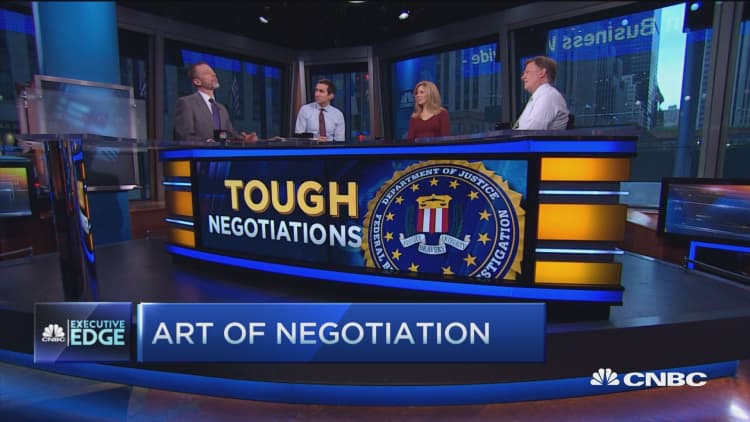Many people enter negotiations with the goal of securing a "yes," but the FBI's former lead international hostage negotiator says eliciting a "no" can be just as powerful — if not more.
"'Yes' is a horrible word. It scares people. They wonder what they've committed themselves to. They become nervous. They become distracted, and when they're distracted, they're not listening to you," Christopher Voss told CNBC's "Squawk Box" on Tuesday.
On the other hand, allowing people to say "no" makes them feel relaxed and protected, he said. In such a state, they tend to better focus on your message, he added.
"This is getting a 'no' that actually moves you forward," he said. "You want an agreement. An agreement is not necessarily through 'yes,' because again, we're so used to being trapped by 'yes.'"
This is just one of the lessons Voss learned during his 24 years with the FBI. He now applies those lessons to coach business executives in communication as CEO of The Black Swan Group.
Negotiators should "listen between the lines" because people tend to express indirectly what they want, he said. Once you know what the other person wants, you should say "no" a little at a time, giving the person across the table the opportunity to come back and continue to negotiate.
"No is a dynamic that you've got to master before you can ever master yes," he said.
The answer people should actually want to elicit is "That's right," he added. To do this, negotiators should restate what it is he or she understands the other person wants.
But people shouldn't be afraid to let negotiations end. Part of the purpose of negotiating is determining whether you want to do business with your counterpart, Voss said.
"The sooner you cut off negotiations with someone you shouldn't be dealing with, it gives you the chance to move on to a more profitable deal," he said.
Another strategy Voss advocates is allowing emotion into negotiations.
"You're supposed to have a passionate purpose as a CEO. What's the difference between passion and emotion?" he said.
"What drives you? What's your motivation? That's not emotion. That's passion. It's a different word."




